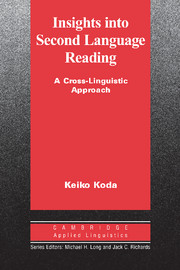9 - Individual differences
Published online by Cambridge University Press: 05 October 2012
Summary
Why study individual differences? There is a simple answer: Virtually all reading competencies are subject to variation. Research on individual differences, therefore, can yield useful information for both reading theory and practice. On theoretical grounds, by dissecting basic competencies, the research can determine their specific contributions to reading capability, which in turn illuminates two fundamental puzzles: what constitutes successful reading and what precisely distinguishes strong from weak readers. In so doing, the research can help refine existing models of reading. On pedagogical grounds, individualdifference studies can yield critical information essential in ensuring instructional quality. For instruction to be efficacious, interventions must target skills that are causally related to reading performance. A clearer understanding of variations in competencies and their direct effect on reading performance can enable practitioners to identify which skills to emphasize with greater accuracy.
As illustrated in previous chapters, considerable data currently are available with respect to the ways readers vary in comprehension capacities: operations such as decoding, syntactic parsing, and coherence building. In the interests of exploring additional dimensions of reading ability, this chapter analyzes research on individual differences from both single-skills and integrative multiple-skills perspectives. The typology and tradition of single-skills studies are examined together with possible limitations of their implications. Newer approaches to analyzing multiple competencies in tandem are then described. As a preliminary observation, it should be stated that, although a wide variety of factors, such as motivation, home print environment, and community support, have been associated with individual differences in reading achievement, the consideration here is restricted to the cognitive and linguistic capabilities directly linked with text-information processing.
- Type
- Chapter
- Information
- Insights into Second Language ReadingA Cross-Linguistic Approach, pp. 181 - 203Publisher: Cambridge University PressPrint publication year: 2005



